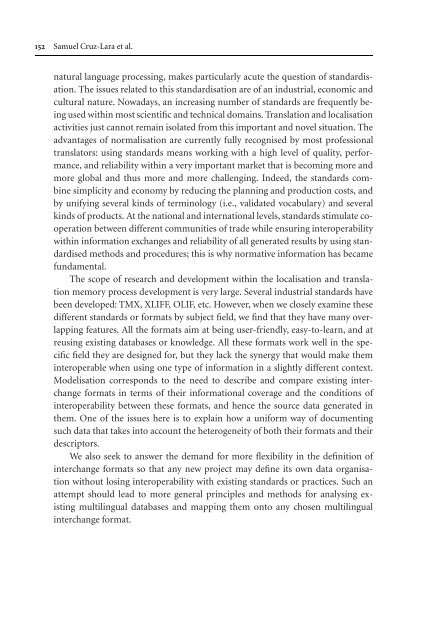Topics in Language Resources for Translation ... - ymerleksi - home
Topics in Language Resources for Translation ... - ymerleksi - home
Topics in Language Resources for Translation ... - ymerleksi - home
- No tags were found...
Create successful ePaper yourself
Turn your PDF publications into a flip-book with our unique Google optimized e-Paper software.
152 Samuel Cruz-Lara et al.natural language process<strong>in</strong>g, makes particularly acute the question of standardisation.The issues related to this standardisation are of an <strong>in</strong>dustrial, economic andcultural nature. Nowadays, an <strong>in</strong>creas<strong>in</strong>g number of standards are frequently be<strong>in</strong>gused with<strong>in</strong> most scientific and technical doma<strong>in</strong>s. <strong>Translation</strong> and localisationactivities just cannot rema<strong>in</strong> isolated from this important and novel situation. Theadvantages of normalisation are currently fully recognised by most professionaltranslators: us<strong>in</strong>g standards means work<strong>in</strong>g with a high level of quality, per<strong>for</strong>mance,and reliability with<strong>in</strong> a very important market that is becom<strong>in</strong>g more andmore global and thus more and more challeng<strong>in</strong>g. Indeed, the standards comb<strong>in</strong>esimplicity and economy by reduc<strong>in</strong>g the plann<strong>in</strong>g and production costs, andby unify<strong>in</strong>g several k<strong>in</strong>ds of term<strong>in</strong>ology (i.e., validated vocabulary) and severalk<strong>in</strong>ds of products. At the national and <strong>in</strong>ternational levels, standards stimulate cooperationbetween different communities of trade while ensur<strong>in</strong>g <strong>in</strong>teroperabilitywith<strong>in</strong> <strong>in</strong><strong>for</strong>mation exchanges and reliability of all generated results by us<strong>in</strong>g standardisedmethods and procedures; this is why normative <strong>in</strong><strong>for</strong>mation has becamefundamental.The scope of research and development with<strong>in</strong> the localisation and translationmemory process development is very large. Several <strong>in</strong>dustrial standards havebeen developed: TMX, XLIFF, OLIF, etc. However, when we closely exam<strong>in</strong>e thesedifferent standards or <strong>for</strong>mats by subject field, we f<strong>in</strong>d that they have many overlapp<strong>in</strong>gfeatures. All the <strong>for</strong>mats aim at be<strong>in</strong>g user-friendly, easy-to-learn, and atreus<strong>in</strong>g exist<strong>in</strong>g databases or knowledge. All these <strong>for</strong>mats work well <strong>in</strong> the specificfield they are designed <strong>for</strong>, but they lack the synergy that would make them<strong>in</strong>teroperable when us<strong>in</strong>g one type of <strong>in</strong><strong>for</strong>mation <strong>in</strong> a slightly different context.Modelisation corresponds to the need to describe and compare exist<strong>in</strong>g <strong>in</strong>terchange<strong>for</strong>mats <strong>in</strong> terms of their <strong>in</strong><strong>for</strong>mational coverage and the conditions of<strong>in</strong>teroperability between these <strong>for</strong>mats, and hence the source data generated <strong>in</strong>them. One of the issues here is to expla<strong>in</strong> how a uni<strong>for</strong>m way of document<strong>in</strong>gsuch data that takes <strong>in</strong>to account the heterogeneity of both their <strong>for</strong>mats and theirdescriptors.We also seek to answer the demand <strong>for</strong> more flexibility <strong>in</strong> the def<strong>in</strong>ition of<strong>in</strong>terchange <strong>for</strong>mats so that any new project may def<strong>in</strong>e its own data organisationwithout los<strong>in</strong>g <strong>in</strong>teroperability with exist<strong>in</strong>g standards or practices. Such anattempt should lead to more general pr<strong>in</strong>ciples and methods <strong>for</strong> analys<strong>in</strong>g exist<strong>in</strong>gmultil<strong>in</strong>gual databases and mapp<strong>in</strong>g them onto any chosen multil<strong>in</strong>gual<strong>in</strong>terchange <strong>for</strong>mat.
















